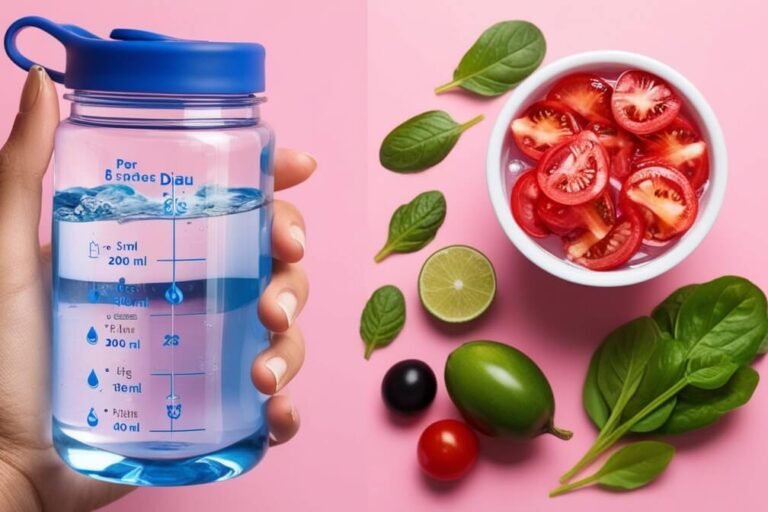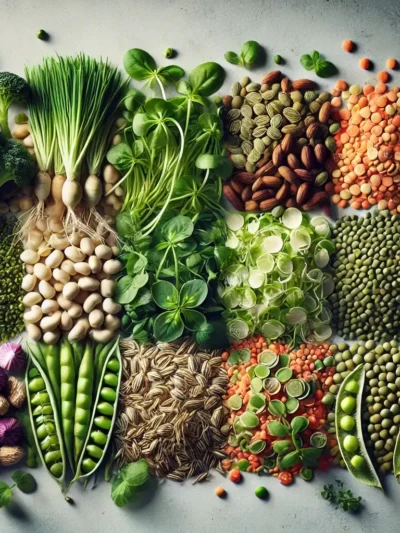One hydration suitable is essential for the proper functioning of our body, but did you know that the dehydration can compromise not only the health, but also the progress in the nutritional reeducation?
The lack of water can be an obstacle to achieving your goals health and well-being.
Have you ever stopped to think about how dehydration affects your body and can prevent the success of your nutritional reeducation?
Will the water does it play such an important role? Find out the answers to these questions and more in this article, where we will analyze the effects from the dehydration in our health and in the progress in the nutritional reeducation.
The Benefits of Hydration for the Body

THE hydration suitable plays an essential role in the proper functioning of our body.
THE water is a vital nutrient, being essential to maintain the balance of body and ensure your health.
When we stay properly hydrated, the body is capable of performing several vital functions efficiently.
Water helps regulate body temperature, lubricate joints, eliminate toxins and metabolic waste, and aid in the absorption of nutrients by the organs.
Furthermore, the hydration suitable can also contribute to efficient nutritional reeducation.
By drinking water regularly, we can better control our appetite, as we often confuse thirst with hunger.
This helps us avoid overeating and maintain a healthy diet. balanced diet.
Adequate water consumption brings countless benefits benefits for our body, from healthier skin to better physical and mental disposition.
When we are well hydrated, the skin is more hydrated, elastic and has a healthier appearance.
Additionally, water helps prevent constipation, reduce bloating and combat fatigue.
Those benefits are important both for our well-being and for the progress in nutritional reeducation.
Benefits of hydration for the body:
- Improves the functioning of the digestive and renal systems.
- Contributes to the absorption of nutrients.
- Helps eliminate toxins.
- Regulates body temperature.
- Keeps skin healthy and hydrated.
- Helps control appetite.
- Prevents constipation and bloating.
- Combats fatigue and improves physical and mental disposition.
It is important to emphasize that each person has their own specific hydration needs, as these can vary depending on weight, age, level of physical activity and climate.
Therefore, it is essential to listen to our body and drink water regularly throughout the day, even when we are not thirsty.

The Importance of Water in Healthy Eating
Water plays a fundamental role in our food healthy.
It is essential for the proper functioning of the body and can help with weight loss during dietary reeducation.
When we talk about healthy eating, we often focus only on the food we consume, forgetting about the importance adequate hydration.
However, water is essential for the absorption and transport of nutrients, elimination of toxins and maintenance of metabolic functions.
Furthermore, water can also be an ally in weight loss.
By choosing to drink water instead of sugary or high-calorie drinks, we reduce our intake of extra calories.
Water helps promote a feeling of fullness, which can help us control our appetite and avoid overeating.
“Water is the most important component of our diet. It is responsible for keeping all the cells in our body functioning properly.” – Dr. José Silva, nutrition specialist.
To stay properly hydrated, it is recommended to drink at least two liters of water daily.
This amount can vary depending on individual needs, level of physical activity and climate, but it is important to ensure that we are always drinking enough to replace losses and maintain adequate water balance.
In addition to water, we can obtain liquids through other sources, such as teas, natural juices and foods with a high water content, such as fruits and vegetables.
However, it is important to emphasize that nothing replaces importance of pure water to hydrate our body.
Benefits of water in a healthy diet
- Improves the functioning of the digestive system;
- Contributes to the absorption and transport of nutrients;
- Helps eliminate toxins;
- Promotes a feeling of satiety;
- Helps regulate appetite;
- Helps you lose weight in a healthy way;
- Improves skin health;
- Promotes good kidney function;
- Helps prevent constipation.
As we can see, water plays a crucial role in our healthy eating.
It is essential for the proper functioning of the body, contributing to the absorption of nutrients, elimination of toxins and appetite control.
Therefore, we cannot neglect the importance of stay hydrated during dietary reeducation.

The Effects of Dehydration on the Body
Dehydration is a serious problem which can negatively affect our body in several aspects.
When we do not stay properly hydrated, we can experience a number of effects harmful to health and which can also compromise progress in nutritional reeducation.
One of the main effects dehydration is the impact on the vital functions of our body.
Lack of water can affect the proper functioning of organs, systems and physiological processes, which can lead to an imbalance in the body.
Additionally, dehydration can affect physical and mental performance.
Lack of adequate hydration can lead to fatigue, decreased concentration, dizziness and even muscle weakness.
These effects may impair the practice of physical exercises and carrying out daily activities.
In the context of nutritional re-education, dehydration can also hinder the desired results.
Water plays a fundamental role in digestion, nutrient absorption and waste elimination from the body.
When we are dehydrated, these processes can be compromised, making it difficult to obtain benefits expected with dietary reeducation.
To better illustrate the effects of dehydration on the body, see the following table:
| Effects of Dehydration on the Body | Consequences |
|---|---|
| Lack of energy and fatigue | Difficulty performing physical and mental activities efficiently. |
| Dry and dull skin | Reduced skin elasticity and greater propensity to wrinkles and other dermatological problems. |
| Digestive system malfunction | Difficulty in properly digesting food and absorbing nutrients, which can lead to problems such as constipation. |
| Poor regulation of body temperature | Difficulty maintaining a stable body temperature, which can lead to discomfort or more serious health problems. |
Water and Weight Loss in Dietary Reeducation
In the search for an efficient process of weight loss During dietary reeducation, many people look for quick and miraculous solutions, neglecting the fundamental role of water in this process.
However, adequate water intake can be a powerful ally in achieving weight loss goals in a healthy and sustainable way.
When it comes to weight loss, adequate hydration plays a crucial role.
By drinking water regularly, you can help eliminate toxins from your body, which contributes to the efficient functioning of your body. metabolism.
Furthermore, water can act as a natural appetite control tool, preventing binge eating and helping to maintain a balanced diet.
“Water is a fundamental element for successful weight loss. Staying hydrated is essential for the proper functioning of the body and for healthy weight loss.”
Often, the feeling of hunger can be confused with thirst. Drinking water regularly helps keep the body hydrated and avoid unnecessary calorie intake.
Furthermore, by replacing high-calorie drinks with water, you can significantly reduce your consumption of sugars and other substances that are harmful to your health.
Another important benefit of water in the process weight loss is the increased feeling of satiety.
Drinking a glass of water before meals can help reduce appetite and control portions consumed, which makes it easier to meet the dietary goals established in the nutritional reeducation.
Therefore, do not underestimate the power of water. To obtain effective results in the weight loss process during the nutritional reeducation, make sure to stay well hydrated and include water as a fundamental part of your eating plan.
Remember that everyone has specific hydration needs, so consult a healthcare professional for personalized guidance.

Adequate Hydration in Healthy Eating
Maintaining adequate hydration is essential for a healthy diet during nutritional reeducation.
Hydration is essential for the proper functioning of our body and plays a crucial role in maintaining optimal health.
When we are making changes to our diet and seeking to re-educate our eating habits, it is even more important to ensure adequate hydration.
Water plays an important role in the digestion, absorption and transportation of nutrients, as well as helping to eliminate toxins from our bodies.
To increase your water intake and stay properly hydrated during your dietary reeducation, there are some tips: tips that can be followed.
One of them is to always carry a bottle of water with you and set daily consumption goals.
Drinking a glass of water on an empty stomach in the morning and before each meal can also help increase your fluid intake.
In addition to water, there are other healthy beverage options that can contribute to adequate hydration.
Teas sugar free, natural coconut water and natural juices without added sugar are good alternatives.
Avoid sugary drinks, soft drinks and alcoholic beverages, as they can compromise hydration and are not healthy for nutritional re-education.
Adequate hydration in a healthy diet is essential for progress in nutritional reeducation.
Ensuring that our body is properly hydrated helps the body to function properly, improves the feeling of satiety and helps prevent fluid retention.
So, don't forget to drink water regularly and include other healthy beverage options in your diet.
Adequate hydration is a fundamental part of a healthy diet during nutritional reeducation, contributing to your success and well-being.
Tips for Staying Hydrated During Dietary Reeducation
Keep your body hydrated is essential to improve the nutritional reeducation process.
Water plays an essential role in the functioning of our body and can contribute to the success of your food transformation journey.
Here are some tips practices to ensure you stay hydrated:
- Set daily water consumption goals: One of the main challenges for stay hydrated is to remember to drink water throughout the day. Set realistic daily water goals, such as drinking at least 8 8-ounce glasses, and track your progress using an app or by writing in a journal.
- Carry a bottle of water with you at all times: Keep a reusable water bottle within reach throughout the day. This will make it easy to access water and serve as a constant reminder to stay hydrated.
- Consume foods rich in water: In addition to drinking water, you can also get hydration from foods that are high in water content, such as watermelon, cucumber, tomatoes, and spinach. Include these types of foods in your daily diet to increase your fluid intake.
- Use reminders: If you tend to forget to drink water, set regular reminders on your phone or use hydration reminder apps. These tools can help you remember to drink a glass of water every hour or at regular intervals throughout the day.
- Watch out for signs of dehydration: It’s important to pay attention to signs of dehydration, such as thirst, dry mouth, dizziness, and fatigue. If you experience these symptoms, drink water immediately and make sure to replace any fluids you’ve lost.
- Some drinks to help with hydration
Remember that everyone is unique and individual hydration needs may vary.
Follow these tips as general guidelines and adjust them as necessary to meet your specific needs.
Dietary reeducation is a process of learning and adaptation, and adequate hydration is an important aspect of this process.

Conclusion
Throughout this article, we explore the effects of dehydration on our bodies and how it can affect our health and progress in re-educating our eating habits.
We discuss the benefits of hydration for the body, highlighting its importance in healthy eating and in the weight loss process.
We provide practical tips for staying hydrated during your dietary reeducation.
It is essential to understand that water plays an essential role in the functioning of the human body, directly influencing health and progress in the process of nutritional reeducation.
Dehydration can compromise the body's performance, hinder weight loss and negatively affect the desired results.
Therefore, we conclude that staying adequately hydrated is essential for health and success in nutritional reeducation.
Make sure you drink water regularly, set daily water goals, and watch for signs of dehydration.
By taking care of your hydration, you will be strengthening your body and contributing to achieving a healthier diet.
FAQ

How does dehydration affect health and progress in nutritional reeducation?
Dehydration can negatively affect your health and progress in nutritional reeducation, as water plays a fundamental role in several of the body's functions.
Lack of water can compromise proper food digestion, nutrient absorption, hormonal balance and even the function of vital organs.
Furthermore, dehydration can lead to fatigue, lack of energy and difficulty in maintaining a healthy diet, compromising the results of the dietary re-education process.
What are the benefits of hydration for the body?
Proper hydration brings several benefits to the body, such as: improving the functioning of the digestive system, helping to eliminate toxins, regulating body temperature, transporting nutrients to cells, lubricating joints, maintaining water balance and improving the appearance of the skin.
Furthermore, being well hydrated contributes to better physical and mental performance, increases the feeling of satiety and helps control appetite, which can be useful in re-educating your eating habits.
How important is water in a healthy diet?
Water plays a fundamental role in healthy eating.
It is essential for the proper functioning of the body, helping in the absorption, transport and adequate use of nutrients.
Furthermore, water is responsible for maintaining the body's hydration, lubricating joints, eliminating toxins and metabolic waste, regulating body temperature and facilitating food digestion.
During your diet, drinking water regularly is important to support weight loss and maintain good health.
What are the effects of dehydration on the body?
Dehydration can cause several negative effects on the body.
In addition to feeling thirsty, symptoms of dehydration include dry mouth, dark urine and reduced urine output, fatigue, dizziness, increased heart rate, headache, and constipation.
In the long term, chronic dehydration can lead to more serious health problems, such as kidney failure, kidney stone formation, and impaired cognitive function.
During nutritional reeducation, dehydration can slow down progress and make it difficult to maintain a healthy diet.
What is the relationship between water and weight loss in nutritional reeducation?
Water plays an essential role in the weight loss process during dietary reeducation.
It helps promote satiety, reducing hunger and excess calorie consumption.
Furthermore, water helps eliminate toxins accumulated in the body, which can contribute to weight loss.
Drinking water regularly can also boost your metabolism and improve fat burning efficiency.
Therefore, staying hydrated is essential for successful weight loss and maintaining a healthy lifestyle.
Why is adequate hydration important in healthy eating?
Proper hydration is important in healthy eating because water plays a vital role in the body's functions.
Drinking enough water throughout the day helps maintain water balance in the body, facilitates digestion and absorption of nutrients, promotes the elimination of toxins, regulates body temperature and helps maintain the proper functioning of organs and tissues.
During nutritional reeducation, staying hydrated is essential to ensure healthy and effective progress, facilitating adaptation to a balanced diet and obtaining satisfactory results.
What are the tips for staying hydrated during a nutritional reeducation?
To stay hydrated during your dietary reeducation, here are some tips:
– Get into the habit of drinking water regularly throughout your day, even if you don’t feel thirsty.
– Use apps or reminders to remind yourself to drink water throughout the day.
– Opt for healthy drinks, such as coconut water, unsweetened teas and natural juices.
– Always have a bottle of water nearby, whether at home, at work or during physical activities.
– Eat foods with a high water content, such as vegetables and fruits.
– Be aware of signs of dehydration, such as thirst, dry mouth and dark urine, and respond promptly by drinking water.









